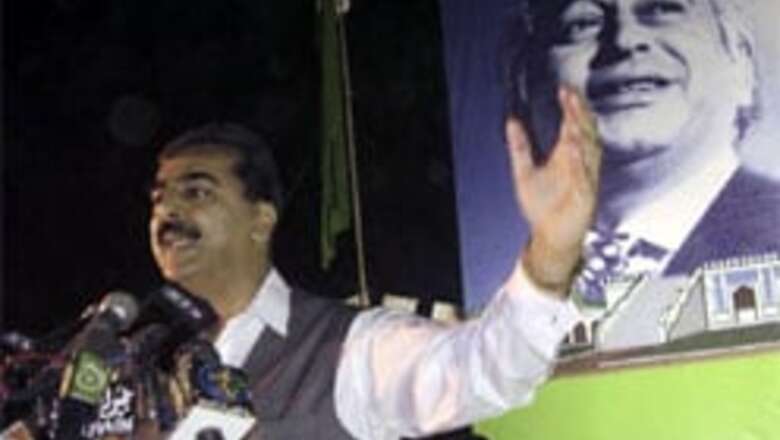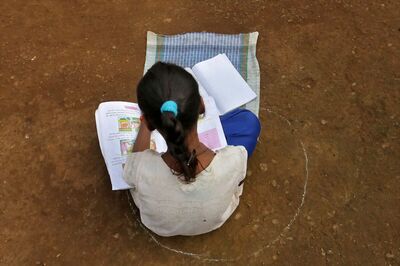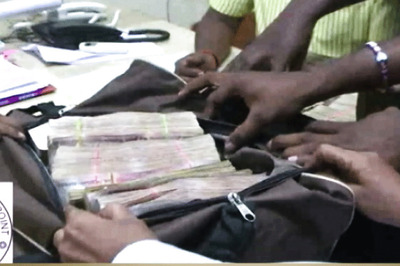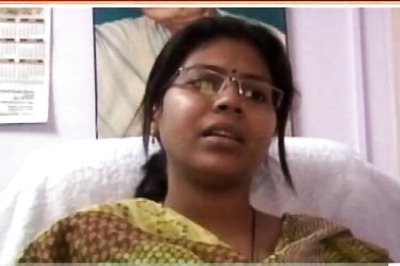
views
With the Musharraf regime coming to an end, a new wave of democracy is sweeping over Pakistan. The PPP has come to power and after weeks of speculation has announced that Yousuf Raza Gilani would be the new Prime Minister of the country.
However, will Gilani be a mere puppet in the hands of PPP co-chairman Asif Ali Zardari? Will Pakistan's stand vis-a-vis India change? And what awaits President Musharraf? Rezaul H Laskar, PTI's Chief Correspondent in Islamabad answers these and more.
Anurag Awasthi: Do you really think that Pakistan today has any leader in comparison to the stature of President Musharraf? Which leader in Pakistan could have handled the Lal Masjid issue or which leader in Pak would have had the courage to launch a war on terror post 9/11 or the CBM initiated by President with India? And I strongly feel that Indian sub-continent had only two statesman – Mr Vajpayee and President Musharraf – and it is ironic that both are out of power at present. It was only because he was heading Pak in the turbulent times (9/11) when Islamophobia was gripping the world that Pakistan has not gone the way of Iraq.
Rezaul H Laskar: I do think that Pakistan today has some very promising leaders who are willing and able to strike out on a distinctive path without the baggage of the past.
Unfortunately, the political parties in Pakistan, like their counterparts in India, have not groomed a second line of younger leaders. However, the trend does now seem to be changing and there are capable people who can take the country forward. There is no doubt that leaders like Vajpayee and Musharraf played a key role in shaping bilateral ties but this is possibly the time to see what the next generation of leaders has to offer on issues like Kashmir.
Prakash Sharma: Every one in Pakistan is now anti-Musharraf. I wonder how suddenly the people of Pakistan suddenly forgot him who did so much for them by getting enormous funds from USA. Today, the image of Pakistan is much better then what it was earlier. Please comment.
Rezaul H Laskar: While President Musharraf might have played a key role in the war on terror, he has become increasingly unpopular among his own people for a variety of reasons, especially spiralling inflation and crippling shortages of gas, electricity and flour. Despite this, the President does still have his supporters though he is no longer as powerful as he once was.
Joseph T A: How will the new government affect the relations between India and Pakistan? Do you see any improvement in the security situation within Pakistan after this?
Rezaul H Laskar: The security situation will probably be the biggest challenge for the new government led by PM Yousuf Raza Gillani. Once the government gets things like its relationship with Musharraf and the reinstatement of the judges out of the way, it will have to get down to the difficult task of stopping the devastating wave of suicide attacks and bombings across the country and tackling the Pakistani Taliban. It will be particularly interesting to watch how it deals with pressure from the US for hard steps against the militants with demands from coalition partners like the Awami National Party for talks with the rebels, including the Pakistani Taliban.
As for ties with India, Zardari has given some indications in his recent comments but I personally feel he will have a hard time convincing the hard-line elements about his views.
Vatjois: Dear Rezaul, for years the very word 'Pakistan' sounds like guns, bombs, extremism, terror. At last, are these conditions changing and is it possible to hear words like 'IT', 'BT', etc?
Rezaul H Laskar: Yes, for far too long, Pakistan has been associated with things like bombings and extremism, but there are also lots of normal, average, peace-loving people among Pakistan's population of 160 million. Things like IT, BT and earning a livelihood and living in peace are very important for the common people in Pakistan. India's massive strides in the economic arena are something that a lot of people would like to emulate. There is a tremendous desire for change, especially among the young.
PAGE_BREAK
Girish Nair: Hi Rezaul, how does the common Pakistani view India?
Rezaul H Laskar: Girish, the average Pakistani accepts the Partition, believes we are two separate and distinct countries and still thinks we have a lot in common. All the stories you hear about the warmth displayed by Pakistanis for common Indians are true. One will never feel out of place in Pakistan, especially if you are from northern India.
Of course, the positive trend in bilateral relations has helped improve people-to-people ties in the past few years. The youth, in particular, are crazy about Bollywood and Indian music and it would be very difficult to find a cabbie in Islamabad who doesn't play Bollywood music!
Saad: How long will the union between Nawaz Sharif and Zardari last? Given the fact that Nawaz Sharfi will not be satisfied with the present arrangement and 5 years are too long a wait for new elctions?
Rezaul H Laskar: Saad, very interesting question. If you look at the basics, Zardari and Nawaz are very different. They have been bitter rivals. People here are very happy that they decided to put aside their differences and come together to steer Pakistan out of one of the most difficult phases in its history. But they will have to grapple with some very tough issues to stay together. The new PM from the PPP today said he would be willing to work with the President, but a few hours later, Sharif again called on Musharraf to quit. I personally think it will be a very tough task for the PPP and PML-N to last the full five-year term. If they do, it will do wonders for this country, which is in need of political stability.
Ross Bhai: Hi Rezaul, your profile says you like writing about movies and music. What do you think about Pakistani music? Do you think it is more 'mature' than Indian music, which seems to be dominated by Bollywood music?
Rezaul H Laskar: Hi Ross, thanks for your question. I have been listening to quite a bit of the Pakistani pop music on radio and TV (that is, when I can get the time) and I must say I find what is being produced in this country is infinitely more interesting than Indi-pop. The lyrics are better and there are more real instruments instead of keyboards and synths. The music sounds fresher and like you said, there is less of "Bollywood" in it. And what is truly interesting is the sheer range that is available – you have stuff that ranges from classical to pop to guys who play straight out blues-rock.
Faisal: Mr Zardari was ‘Mr 10 Per cent’ when his wife was the Prime Minister. Why should Pakistanis believe that he would be an honest man now when he is the king-maker?
Rezaul H Laskar: There are many people here who say Mr Zardari has changed from his days as ‘Mr 10 Per Cent’ since the unfortunate assassination of his wife. But there are also some who remain unconvinced by his new image. Only time can provide a real answer to your question.
Pritish Bharat: What will be the main agenda of Zardari ? Will it be looking inwards (economy/ law & order/ improving socio-economic conditions) or outwards (Kashmir)? If it is inwards, it would mean economic cooperation with India, if it is outwards, then there is the never-ending political imbroglio of Kashmir, which has been haunting 150 million people from both sides without any gains to the people of India or Pakistan.
Rezaul H Laskar: I would assume that the new government in Pakistan would have to look at the internal issues first. The country has huge economic problems, it is grappling with crippling shortages of gas, electricity and flour. Terrorism and relentless suicide attacks have created fear among the people and the economy has taken a hit. I would guess that the new administration could take up "outward" issues only after sorting out these internal problems.
Besides, the new government will also have to contend with tricky issues like its relationship with Musharraf and the reinstatement of the deposed judges.
PAGE_BREAK
Manohar: Pakistan government is dropping all charges against Zardari saying there’s not much evidence. I am not sure how much is this correct. Don’t you feel that it’s misuse of power?
Rezaul H Laskar: Mr Zardari and his late wife were able to return to Pakistan mainly due to the National Reconciliation Ordinance (NRO), a controversial law passed by Musharraf to grant amnesty to PPP leaders in corruption cases. This was part of the secret understanding between Benazir Bhutto and Musharraf. There are some legal experts who believe the deposed judges, once they are reinstated, will reopen cases challenging the NRO. That could add yet another twist to the dropping of charges against Mr Zardari.
Gurjeet S.Sekhon: Will the new government liberalize trade through Wagah Border and what volumes one can expect?
Rezaul H Laskar: Trade has slowly become a key issue in the relations between India and Pakistan. Pakistani businessmen are eyeing the huge Indian market for a range of their products, including cement. But traders from both sides agree there is a need to improve infrastructure on both sides. Besides, there appears to be a very strong lobby within Pakistan which is opposed to imports from India and raises the "India bogey" to prevent imports.
On the other hand, you have the strange phenomenon of Indian goods being imported from third countries, like the recent case of Indian-made CNG buses that were imported into Pakistan from the Gulf.
Pradyumna Kejriwal: Do you believe the new government in power will take on the challenge of tackling extremism within Pakistan? If so, do you expect them to accept American support against terrorism?
Rezaul H Laskar: Well, PML-N chief Nawaz Sharif, who is a key player, in the new government, has already made it clear that he will not toe the US line in the war on terror. Therefore, the new government will have to walk a very delicate line while considering the war on terror and extremism. On the one hand the new administration has to curb the trend of suicide attacks and bombings and on the other hand it has to consider demands from some key allies, like the Awami National Party and Jamiat Ulema-e-Islam, for talks with the militants, including the Pakistani Taliban.
Sarfraz Ahmed: Do you think Asif Zardari would pave a path for better Indo-Pak ties or will he follow the lines of Kashmir?
Rezaul H Laskar: Mr Zardari's initial comments on Kashmir – about setting the issue aside for a future generation – were a bold departure from the norm but they created a storm among some sections of Kashmiri leaders and the hardliners here in Pakistan. Since then, he has not spoken on the issue. I believe he wants to try a different tack on Kashmir but it remains to be seen if he can sway partners in the new government like the Jamiat Ulema-e-Islam.
Anupam Srivastava: Congratulations for doing a great job there. My question is: How is the power of the military being diluted in Pakistan since it has the potential of again destabilising democracy when another general decides.
PAGE_BREAK
Rezaul H Laskar: Hi Anupam. Well, difficult to say if the power of the military has been diluted. It still remains a key player in Pakistan. But in Gen Kayani, Pakistan has a very able Chief of the Army who has taken several decisions to remove the military from the political scenario. These decisions have been appreciated by the people, and for a change, there is a thinking that now the army must focus on itself, its personnel and the security challenges before the country and not on politics. So in the short term, the army is not likely to play a role in politics.
S Malviya: What will be their stand towards terrorism in Pakistan-sponsored terrorism in India? Will the terrorist training camps continue in Pak?
Rezaul H Laskar: I think there is now a growing realisation in Pakistan that terrorists and militants pose a huge danger to the country. There were 70 suicide bombings last year and things have bad this year too. A former prime minister, a general and scores of security personnel have been killed by the suicide attackers, and this has already impacted the policy-makers and the security establishment. All this is bound to lead to a change in the way terrorism is tackled.
KK: Will Zardari and his government interfere in Sarabjit issue and save him?
Rezaul H Laskar: Well, what we have heard is that the main idea behind the postponement of Sarabjit's execution was to give the new government a chance to study this tricky issue. But the new dispensation will decide to put off Sarabjit's hanging is still up in the air. The recent death of a Pakistani national in Indian custody certainly has queered the pitch.
Sriram: Where will Mr. Nawas Sharif feature in this political equation in Pakistan? Will he feature at all or is he just a 12th man in the near future?
Rezaul H Laskar: Interesting question, Sriram. I think a man like Nawaz Sharif can never be a 12th man. He has a very key role to play in the new set-up and besides, he controls the politically-crucial province of Punjab. But I, somehow, get the feeling that Sharif is a man who has his eyes on the next election and on preparing his party for that.
Preetam: Will Zardari and the Pak Army allow the new govt to function?
Rezaul H Laskar: The Pakistan Army has indicated that it wishes to stay out of politics under its new chief Gen Kayani. This will probably give the new government room to manoeuvre and take some tough decisions on a wide range of issues, including the war on terror and relations with India, including the Kashmir dispute.


















Comments
0 comment